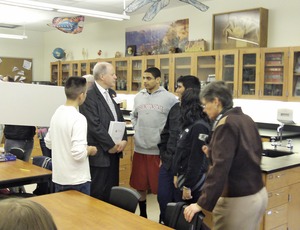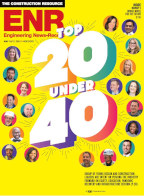
Dean Allen, CEO of Seattle-based contractor McKinstry, is not OK with too many kids in the state giving up on the study of science, technology, engineering and math. In fact, the head of one of the Northwest's largest mechanical-electrical firms is so frustrated that the lack of STEM proficiency could impact the firm's future workforce, he is leading a new statewide public-private advocacy group that has pledged $100 million over the next decade to improve instruction and student experience in those core fields, both in school and out of the classroom.
The group, called Washington STEM, was launched in spring 2011. Allen is president of its board of private-sector executives and state and local educators.
"What got us upset and motivated was that the jobs that we had and were creating were heavily dependent on math and science competency, and there were insufficient kids out of higher education or high school to compete for the positions," he says. Allen remembers rejected company job applicants "who were crushed in our lobby because someone along the way said you don't have to be good in math and science."
Washington STEM is part of STEMx—a network of 14 state STEM advocacy programs (see chart) that are being started with support from firms, such as the research organization Battelle, and from foundations run by Microsoft founder Bill Gates and Amazon CEO Jeff Bezos.
STEMx officials say the programs are impacting more than 6 million students across the U.S., but they acknowledge Washington state's particular effectiveness in engaging private sector participation. "Washington STEM sets itself apart for its very strong ties to the state's business community and for its investments in scaling programs statewide," says Courtney Hodapp, Battelle program manager for STEMx. The state program "also has been a key collaborator in the growth of STEMx, working with partners across the network," she points out.
Washington STEM board members include Bill Lewis, CEO of another Seattle builder, Lease Crutcher Lewis, as well as executives from Microsoft, Boeing and Fluke Corp., an Everett, Wash.-based electronics manufacturer. The group also counts JP Morgan Chase, Safeco and Concur Technologies among its "partners."
Sandi Everlove, Washington STEM's chief learning officer, says teaching STEM subjects in new and meaningful ways is what engages the students and parents.
A group of Seattle builders ran a 10-week after-school class at Lincoln High School in Tacoma that focused on challenges on an area jobsite, Everlove notes. When the course ended, students traveled to the actual jobsite in Seattle, creating what she called a "spark" that indicates a tangible connection with engineering.
"There are a lot of different experiences at different stages of kids' lives that will add up to a more diverse population seeing that STEM careers are exciting, fun, pay well and can actually be done," she says.




Post a comment to this article
Report Abusive Comment